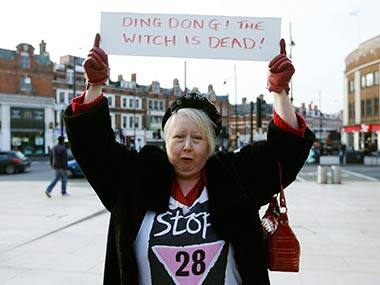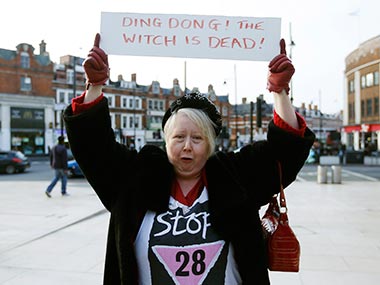In principle, at such a difficult time that is shared by all humans – death – we should be looking for the human side of Thatcher," writes left leaning UK blogger Steve Hynd, criticising the unabashed rejoicing among his ideological peers at the Iron Lady’s death. “Her life and now her death were political and many think that justifies a public argument within seconds of her death. Personally I take her death as a reminder that behind every politician is just an ordinary person that has friends, family and yes…. even emotions.” The fiercely divided public reception of Margaret Thatcher’s death has been every bit as exceptional as her political life. It is hard to think of another leader of a democracy whose demise was celebrated with impromptu street parties and tweets such these: “Thatcher’s dead. Hip hip hooray! She was an evil fascist feckin witch.” In comparison, Ronald Reagan, her ideological soulmate and fellow polariser, passed from this world with unqualified ease. The condemnation of this “unseemly” display — issued by Tory and Labour party leaders alike — raises a key question about democratic discourse: Does death require decorum? Does the passing of a public figure require that we restrain ourselves to polite niceties — irrespective of their political legacy? Guardian commentator Glen Greenwald doesn’t believe so. In an op-ed titled “Margaret Thatcher and the misapplied death etiquette,” he argues the demand for “respectful silence” is misguided and dangerous:
[T]hose who admire the deceased public figure (and their politics) aren’t silent at all. They are aggressively exploiting the emotions generated by the person’s death to create hagiography… Those gushing depictions can be quite consequential, as it was for the week-long tidal wave of unbroken reverence that was heaped on Ronald Reagan upon his death, an episode that to this day shapes how Americans view him and the political ideas he symbolized. Demanding that no criticisms be voiced to counter that hagiography is to enable false history and a propagandistic whitewashing of bad acts, distortions that become quickly ossified and then endure by virtue of no opposition and the powerful emotions created by death. When a political leader dies, it is irresponsible in the extreme to demand that only praise be permitted but not criticisms.
Champagne-soaked celebrations may be inappropriate, but such is the price of being a powerful public figure who is no longer “just human” but a symbol — whether of a brand of politics or a period in history. Thatcher was both. It is a testimony to Britain’s robust democracy that such reactions occur without reprisal or inciting riots. In India, lesser liberties are swiftly squelched — as Bal Thackeray’s demise confirmed. Thackeray’s political record was more dubious than that of Thatcher, and yet his death evoked fawning praise from politicians and celebrities, rivals and supporters alike. The Prime Minister described him as “a consummate communicator whose stature in the politics of Maharashtra was unique.” Ram Gopal Varma sought to outdo his reverent Bollywood peers with this bit of hyperbole: “Crowds at [Balasahebs’] remind me of a line from Attenborough’s Gandhi: ‘Generations to come will scarce believe that a man such as this ever walked this earth.’” Thackeray’s history of incendiary rhetoric was recast as a virtue, or as one TV commentator put it: “[He was] a straightforward man, a man who spoke what he thought, did what he believed.” [caption id=“attachment_693617” align=“alignleft” width=“380”]  The fiercely divided public reception of Margaret Thatcher’s death has been every bit as exceptional as her political life. Reuters[/caption] The unashamed hagiography was excused in the name of good manners. “[De Mortius] Nil nisi bonum. Speak no ‘ill’ of the dead. Respect them in the hours of their death,” declared the usually loud-mouthed Mahesh Bhatt. Shaheen Dhada soon discovered that this demand for respect was absolute, and included arresting two young women for an inncocuous Facebook update. Tehelka writer Revathi Laul views this requirement for obeisance as a cultural trait :
[E]ach time a public figure dies, we go into collective denial and amnesia. With only one sensory perception working, death equals eulogy. And so, for an entire day and a half, television news has breathlessly covered Shiv Sena Chief Bal Thackeray’s death as if he wasn’t just a politician, or demagogue but a martyr. What could have been an opportunity to look plain and hard at the political profile of India’s most controversial politician turned into a stream of obsequious gushing in which there was absolutely no room for reality…
It isn’t just Thackeray who received the “death” pass, but also, as Laul points out, the likes of Pramod Mahajan and the man implicated in the 1982 anti-Sikh riots, HKL Bhagat. In Indian politics, death elevates all. This airbrushing isn’t merely a reflection of our discomfort with death, as Laul argues, but also a measure of our culture-coded obsequiousness. Our first instinct is to bow our head in the presence of power, whether in life or death. We scramble to pay our respects to only those who count – irrespective of how they attained their ‘iconic’ status. Tory MEP Daniel Hannan may well decry the “sheer nastiness of a certain kind of leftie” — and be entirely right — but he should be thankful that he lives in a democracy that tolerates such ‘uppity’ behaviour even when it is aimed at one of the most powerful leaders in recent history.


)
)
)
)
)
)
)
)
)



